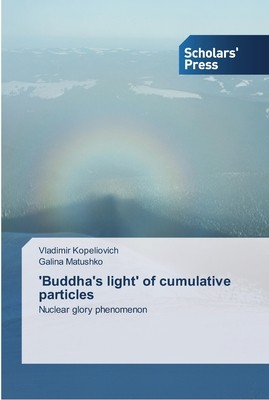
- We will send in 10–14 business days.
- Author: Vladimir Kopeliovich
- Publisher: Scholars' Press
- Year: 2015
- Pages: 60
- ISBN-10: 363976496X
- ISBN-13: 9783639764963
- Format: 15.2 x 22.9 x 0.4 cm, softcover
- Language: English
- SAVE -10% with code: EXTRA
Reviews
Description
Analytical explanation of the nuclear glory effect in the cumulative particles production, which is similar to the known optical (atmospheric) glory phenomenon, is presented. Employing the small phase space method we arrived at a characteristic angular dependence of the production cross section dσ ∼ 1/√(π - θ) near the strictly backward direction. This effect takes place for any number n >= 3 of interactions of rescattered particle, either elastic or inelastic (with resonance excitations in intermediate states), when the final particle is produced near corresponding kinematical boundary. In the small final angles interval including the value θ = π the angular dependence of the cumulative production cross section can have the crater-like (or funnel-like) form. Further studies including, probably, certain numerical calculations, are necessary to clear up this point. Such a behaviour of the cross section near the backward direction is in qualitative agreement with available data. Some mathematical aspects of the nuclear glory phenomenon in the cumulative particles production, which are of methodical interest, are discussed as well.
EXTRA 10 % discount with code: EXTRA
The promotion ends in 18d.06:01:26
The discount code is valid when purchasing from 10 €. Discounts do not stack.
- Author: Vladimir Kopeliovich
- Publisher: Scholars' Press
- Year: 2015
- Pages: 60
- ISBN-10: 363976496X
- ISBN-13: 9783639764963
- Format: 15.2 x 22.9 x 0.4 cm, softcover
- Language: English English
Analytical explanation of the nuclear glory effect in the cumulative particles production, which is similar to the known optical (atmospheric) glory phenomenon, is presented. Employing the small phase space method we arrived at a characteristic angular dependence of the production cross section dσ ∼ 1/√(π - θ) near the strictly backward direction. This effect takes place for any number n >= 3 of interactions of rescattered particle, either elastic or inelastic (with resonance excitations in intermediate states), when the final particle is produced near corresponding kinematical boundary. In the small final angles interval including the value θ = π the angular dependence of the cumulative production cross section can have the crater-like (or funnel-like) form. Further studies including, probably, certain numerical calculations, are necessary to clear up this point. Such a behaviour of the cross section near the backward direction is in qualitative agreement with available data. Some mathematical aspects of the nuclear glory phenomenon in the cumulative particles production, which are of methodical interest, are discussed as well.


Reviews